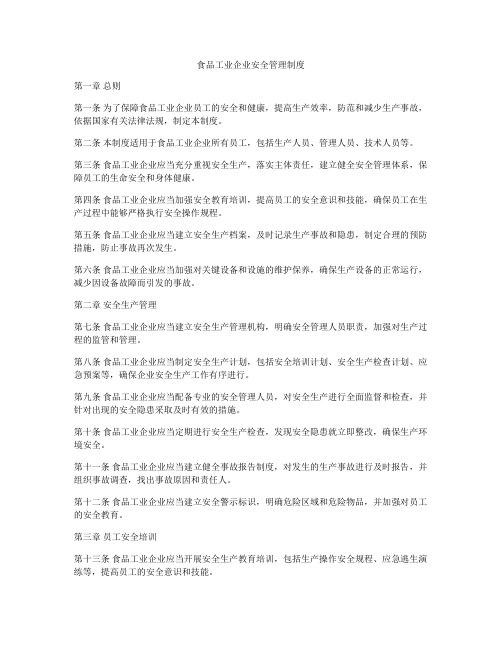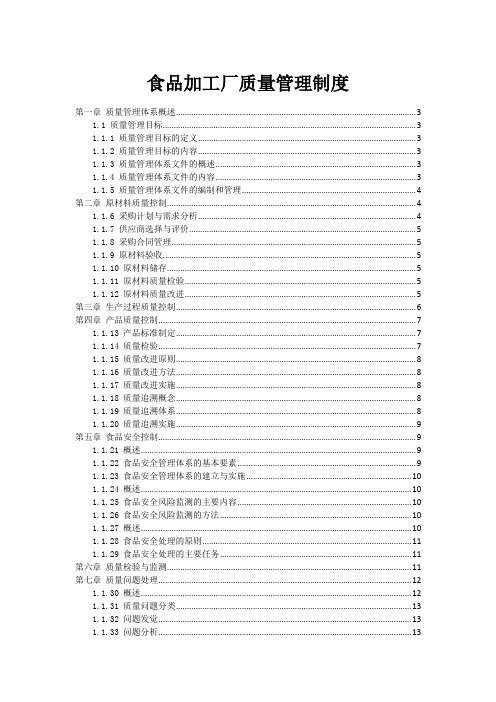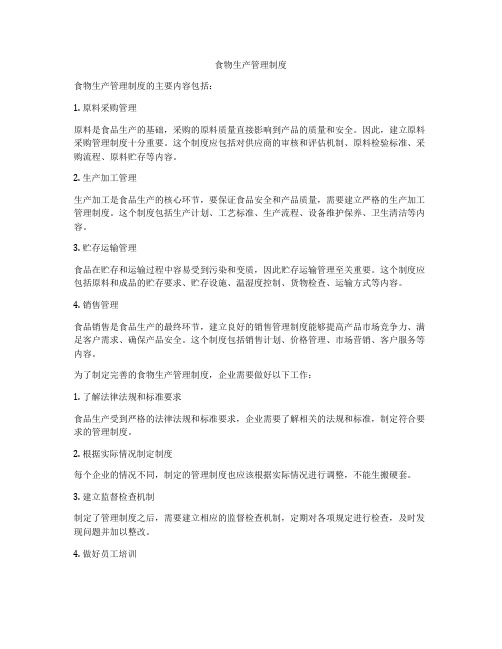食品工业企业管理材料
大型食品公司管理制度

大型食品公司管理制度一、组织架构与职责大型食品公司应建立一个清晰的组织架构,明确各部门的职责和相互之间的协作关系。
通常包括管理层、生产部、质量控制部、研发部、营销部、人力资源部和财务部等。
每个部门应根据公司的总体目标制定具体的工作计划,并定期评估执行情况。
二、生产管理生产管理是食品公司的核心,需要严格遵守国家关于食品生产的法律法规。
公司应制定详细的生产流程规范,包括原料采购、加工、包装、储存和运输等各个环节。
同时,应实施批次追踪系统,确保一旦出现问题能迅速定位并采取措施。
三、质量控制质量控制部门负责监督和检验产品的生产过程,确保产品符合国家标准和公司标准。
应建立一套完整的质量检测体系,对原料、半成品和成品进行全面检测。
还应定期对生产设备进行维护和校准,防止因设备故障影响产品质量。
四、研发创新研发部门是推动公司长远发展的引擎。
公司应投入相应的资源支持新产品的研发和现有产品的改良。
研发团队应密切关注市场动态和消费者需求,不断推出符合市场趋势的新产品。
五、营销策略营销部负责制定和执行市场推广计划,包括品牌建设、广告宣传、销售渠道拓展等。
公司应利用多种媒体平台进行宣传,同时加强与经销商的合作,扩大销售网络。
六、人力资源管理人力资源部应制定合理的招聘、培训、考核和激励机制。
通过提供有竞争力的薪酬福利和职业发展机会吸引和留住人才。
定期组织员工培训,提升员工的专业技能和综合素质。
七、财务管理财务部负责公司的财务规划、预算管理和资金运作。
应确保财务数据的准确性和透明度,合理控制成本,提高资金使用效率。
八、环境与社会责任作为食品行业的一员,公司应承担起环境保护和社会责任。
在生产过程中应采取节能减排措施,减少对环境的影响。
同时,公司应积极参与社会公益活动,回馈社会。
结语。
浅析吉林省食品加工企业的全面质量管理

食品工业企业安全管理制度

食品工业企业安全管理制度第一章总则第一条为了保障食品工业企业员工的安全和健康,提高生产效率,防范和减少生产事故,依据国家有关法律法规,制定本制度。
第二条本制度适用于食品工业企业所有员工,包括生产人员、管理人员、技术人员等。
第三条食品工业企业应当充分重视安全生产,落实主体责任,建立健全安全管理体系,保障员工的生命安全和身体健康。
第四条食品工业企业应当加强安全教育培训,提高员工的安全意识和技能,确保员工在生产过程中能够严格执行安全操作规程。
第五条食品工业企业应当建立安全生产档案,及时记录生产事故和隐患,制定合理的预防措施,防止事故再次发生。
第六条食品工业企业应当加强对关键设备和设施的维护保养,确保生产设备的正常运行,减少因设备故障而引发的事故。
第二章安全生产管理第七条食品工业企业应当建立安全生产管理机构,明确安全管理人员职责,加强对生产过程的监管和管理。
第八条食品工业企业应当制定安全生产计划,包括安全培训计划、安全生产检查计划、应急预案等,确保企业安全生产工作有序进行。
第九条食品工业企业应当配备专业的安全管理人员,对安全生产进行全面监督和检查,并针对出现的安全隐患采取及时有效的措施。
第十条食品工业企业应当定期进行安全生产检查,发现安全隐患就立即整改,确保生产环境安全。
第十一条食品工业企业应当建立健全事故报告制度,对发生的生产事故进行及时报告,并组织事故调查,找出事故原因和责任人。
第十二条食品工业企业应当建立安全警示标识,明确危险区域和危险物品,并加强对员工的安全教育。
第三章员工安全培训第十三条食品工业企业应当开展安全生产教育培训,包括生产操作安全规程、应急逃生演练等,提高员工的安全意识和技能。
第十四条食品工业企业应当针对不同岗位的员工进行安全培训,确保员工了解相关操作规程和安全防范知识。
第十五条食品工业企业应当建立员工安全培训档案,并定期进行安全知识考核,确保员工的安全知识真正掌握。
第十六条食品工业企业应当对新员工进行安全生产培训,确保新员工入职后能够在短时间内熟悉操作规程。
食品企业管理

任务2
食品企业管理 概述
1.2.1 食品企业管理的概念 食品企业管理,就是由食品企业的管理人员或管理机构对 食品企业的经营活动过程进行计划、组织、领导和控制, 以提高经济效益,实现以营利为目的的活动的总称。
3
1.2.2食品企业管理的职能
1 计划职能
管理 职能
2 组织职能 3 领导职能
4 控制职能
任务3
食品企业管理 的原理与方法
1.3.1 食品企业管理的原理
管理 原理
系统原理
1 (1)整体性观点。 (2)开放性观点。 (3)动态性观点。 (4)综合性观点。
2 人本原理 (1)能级原则。 (2)动力原则。
3 效益原理 (1)效用最大化原则。 (2)效益最优原则。
4 80/20原理
1.3.2食品企业管理的方法
3
1.1.4 现代企业制度
1 产权清晰
现代企 业制度 特征
2 权责明确 3 政企分开
4 管理科学
1.1.4 现代企业制度
现代企 业制度 内容
1 现代企业产权制度 1)产权 2)产权制度 3)现代企业产权制度
2 现代企业组织制度 1)股东大会 2)董事会 3)监事会 4)经理
现代企业管理制度
3 1)现代企业领导制度 2)现代企业劳动人事制度 3)现代企业财务制度 4)现代企业破产制度
1 法律方法
管理 方法
2 行政方法 3 经济方法4 教育方法5 数学方法
THANK YOU
18
案 例
项目1 食品企业管理
目录
PAGE DIRECTORY
任务1 食品企业
任务2 食品企业管理概 述
任务3 食品企业管理 的方法
食品加工厂质量管理制度

食品加工厂质量管理制度第一章质量管理体系概述 (3)1.1 质量管理目标 (3)1.1.1 质量管理目标的定义 (3)1.1.2 质量管理目标的内容 (3)1.1.3 质量管理体系文件的概述 (3)1.1.4 质量管理体系文件的内容 (3)1.1.5 质量管理体系文件的编制和管理 (4)第二章原材料质量控制 (4)1.1.6 采购计划与需求分析 (4)1.1.7 供应商选择与评价 (5)1.1.8 采购合同管理 (5)1.1.9 原材料验收 (5)1.1.10 原材料储存 (5)1.1.11 原材料质量检验 (5)1.1.12 原材料质量改进 (5)第三章生产过程质量控制 (6)第四章产品质量控制 (7)1.1.13 产品标准制定 (7)1.1.14 质量检验 (7)1.1.15 质量改进原则 (8)1.1.16 质量改进方法 (8)1.1.17 质量改进实施 (8)1.1.18 质量追溯概念 (8)1.1.19 质量追溯体系 (8)1.1.20 质量追溯实施 (9)第五章食品安全控制 (9)1.1.21 概述 (9)1.1.22 食品安全管理体系的基本要素 (9)1.1.23 食品安全管理体系的建立与实施 (10)1.1.24 概述 (10)1.1.25 食品安全风险监测的主要内容 (10)1.1.26 食品安全风险监测的方法 (10)1.1.27 概述 (10)1.1.28 食品安全处理的原则 (11)1.1.29 食品安全处理的主要任务 (11)第六章质量检验与监测 (11)第七章质量问题处理 (12)1.1.30 概述 (12)1.1.31 质量问题分类 (13)1.1.32 问题发觉 (13)1.1.33 问题分析 (13)1.1.35 问题反馈 (13)1.1.36 加强质量管理 (14)1.1.37 优化工艺流程 (14)1.1.38 提升设备水平 (14)1.1.39 加强供应商管理 (14)1.1.40 加强顾客服务 (14)第八章质量培训与教育 (14)1.1.41 质量意识培训的重要性 (14)1.1.42 质量意识培训内容 (15)1.1.43 质量意识培训方式 (15)1.1.44 质量管理体系培训的目的 (15)1.1.45 质量管理体系培训内容 (15)1.1.46 质量管理体系培训方式 (15)1.1.47 质量技能培训的意义 (15)1.1.48 质量技能培训内容 (16)1.1.49 质量技能培训方式 (16)第九章质量考核与奖惩 (16)1.1.50 概述 (16)1.1.51 指标设置原则 (17)1.1.52 制定考核标准 (17)1.1.53 确定考核周期 (17)1.1.54 收集考核数据 (17)1.1.55 实施考核评估 (17)1.1.56 奖励措施 (17)1.1.57 惩罚措施 (17)1.1.58 奖惩原则 (17)1.1.59 奖惩实施 (18)第十章质量管理体系内部审核 (18)1.1.60 内部审核的定义与目的 (18)1.1.61 内部审核流程的步骤 (18)1.1.62 内部审核结果的分类 (18)1.1.63 内部审核结果处理方法 (18)1.1.64 改进措施的制定 (19)1.1.65 改进措施的实施 (19)1.1.66 改进措施的评价 (19)第十一章质量管理体系认证与监督 (19)1.1.67 质量管理体系认证概述 (19)1.1.68 质量管理体系认证的条件及流程 (19)1.1.69 认证后的监督 (20)1.1.70 认证后的维护 (20)第十二章质量管理信息化 (21)1.1.71 系统建设背景 (21)1.1.72 系统建设目标 (21)1.1.74 质量数据分析方法 (22)1.1.75 质量数据分析应用 (22)1.1.76 信息安全概述 (22)1.1.77 信息安全措施 (22)第一章质量管理体系概述1.1 质量管理目标1.1.1 质量管理目标的定义质量管理目标是组织在质量方面所追求的预期成果,它是质量管理体系的核心内容,反映了组织对质量的承诺和追求。
食品生产加工企业质量安全管理制度(4篇)

食品生产加工企业质量安全管理制度一、总则为确保食品生产加工企业的质量安全管理工作,加强对食品生产加工过程的监督和控制,制定本制度。
二、组织与管理1. 设立质量安全管理部门,并明确其职责和权力;2. 质量安全管理部门负责制订和修订相关质量安全管理制度,并进行内部培训;3. 设立质量安全管理委员会,负责对企业质量安全管理工作的监督和指导;4. 建立质量安全管理档案,包括质量安全管理制度、培训记录、检查记录等;5. 定期对质量安全管理制度进行评估和修订。
三、人员管理1. 严格落实人员岗前培训制度,对从业人员进行相应的技能培训和质量安全知识培训;2. 实行健康体检制度,定期对从业人员进行健康检查;3. 对从业人员进行岗位责任和职业道德培训,强调食品质量安全意识;4. 建立奖惩制度,对从业人员的质量安全工作进行考核,并给予奖励或处罚;5. 提供必要的防护设施和个人防护用品,确保从业人员的工作环境安全。
四、设备管理1. 公司应配备适用的设备,确保设备的正常运行和维修保养;2. 对设备进行定期的检修和保养,确保设备的正常工作;3. 配备符合食品生产加工要求的设备,如温度计、计量器等;4. 对设备进行定期的检验和校准,确保其准确性和可靠性。
五、原料采购和入库管理1. 配备专门的原料采购人员和质量检验人员,确保采购的原料符合相关标准;2. 与供应商建立稳定的合作关系,确保供应商的质量安全管理体系;3. 对每批原料进行质量检验,并记录相应的检验结果;4. 采用先进的原料入库管理系统,确保原料的准确入库和标识;5. 对不合格的原料及时处理和追溯。
六、生产加工管理1. 根据产品的特性制定相应的生产加工工艺流程和标准作业规程;2. 确保生产加工过程的严格控制和记录,包括温度、时间、工艺参数等;3. 建立原料使用记录,确保原料的使用数量和追溯;4. 对产品进行质量检验,确保产品符合相关标准;5. 进行生产环境和设备的消毒和清洁工作;6. 建立产品追溯体系,保证产品的可追溯性。
食品工业企业管理资料

(二)有效的管理者应当尽
快完成的五项有效管理任务
——即设定目标、组织、决策、控制、人才扶持
和培养。
(三)有效的管理者必须获
得的五项心理习惯——一是合理安
排时间,二是致力外界贡献,三是重视发挥长处, 四是集中少数领域,五是作出有效决策。
(四)有效的管理者的8个思维 规则
(五)工业企业经理必须要做的五 项工作
德鲁克将经理人的工作分为以下五项:
1 制定目标; 2 组织; 3 激励与沟通; 4 衡量; 5 培养他人(包括自己)。
三、职业经理人
(一)职业经理人的定位
——职业经理人是以担任管理职务为 职业的专业人才。从本职而言,职业经理 人是以其专业管理能力,协助企业拥有者 执行经营管理职责的人,其对于工业企业 的运作能力,必须使委托他的股东们能够 获得高度的信赖感与应有的回报。
三是洞察力修炼——修炼洞察力,就是要
做到把握事物的发展趋势。要求干部具备 很强的分析判断和推理能力。联想推理尤 其重要。 四是胆魄修炼——一个胆小如鼠的人很难 想象他能是一个称职的领导干部,当领导 就是不断战胜困难,才能取得一步一步的 成功
五是赏罚修炼——人们常说“赏罚严明”。
这是对赏罚问题的要求。关键要学会把握 一个“度”。 六是作风修炼——良好的作风可以使人具 有强烈的感染力,吸引追随者。
6、协调经理——创造出一个团结一致的整体 7、专家经理——在专业问题上对其他经理提
8、新经理——新担任经理职务者,致力于收集
集中信息和连络者的角色。
(三)工业企业经理的十种角色
1、挂名首脑——经理由于具有正式权威,是一个
组织的象征,必须履行许多这类性质的职责;
食物生产管理制度

食物生产管理制度食物生产管理制度的主要内容包括:1. 原料采购管理原料是食品生产的基础,采购的原料质量直接影响到产品的质量和安全。
因此,建立原料采购管理制度十分重要。
这个制度应包括对供应商的审核和评估机制、原料检验标准、采购流程、原料贮存等内容。
2. 生产加工管理生产加工是食品生产的核心环节,要保证食品安全和产品质量,需要建立严格的生产加工管理制度。
这个制度包括生产计划、工艺标准、生产流程、设备维护保养、卫生清洁等内容。
3. 贮存运输管理食品在贮存和运输过程中容易受到污染和变质,因此贮存运输管理至关重要。
这个制度应包括原料和成品的贮存要求、贮存设施、温湿度控制、货物检查、运输方式等内容。
4. 销售管理食品销售是食品生产的最终环节,建立良好的销售管理制度能够提高产品市场竞争力、满足客户需求、确保产品安全。
这个制度包括销售计划、价格管理、市场营销、客户服务等内容。
为了制定完善的食物生产管理制度,企业需要做好以下工作:1. 了解法律法规和标准要求食品生产受到严格的法律法规和标准要求,企业需要了解相关的法规和标准,制定符合要求的管理制度。
2. 根据实际情况制定制度每个企业的情况不同,制定的管理制度也应该根据实际情况进行调整,不能生搬硬套。
3. 建立监督检查机制制定了管理制度之后,需要建立相应的监督检查机制,定期对各项规定进行检查,及时发现问题并加以整改。
4. 做好员工培训员工是执行管理制度的主体,企业应该对员工进行相关的培训,使他们能够严格执行管理制度。
5. 确保持续改进食品生产技术日新月异,企业需要不断改进和完善管理制度,以适应市场和技术的变化。
食物生产管理制度的建立和实施是企业质量管理体系的重要组成部分,对食品企业来说是至关重要的。
只有通过完善的管理制度,企业才能够提高食品安全和质量,赢得客户信任,久立不败。
- 1、下载文档前请自行甄别文档内容的完整性,平台不提供额外的编辑、内容补充、找答案等附加服务。
- 2、"仅部分预览"的文档,不可在线预览部分如存在完整性等问题,可反馈申请退款(可完整预览的文档不适用该条件!)。
- 3、如文档侵犯您的权益,请联系客服反馈,我们会尽快为您处理(人工客服工作时间:9:00-18:30)。
Unit OneWho Makes It to the TopWhat does it take to succeed in American business? Opinions vary widely. Given approximately equal qualifications and circumstances, some claim the success factor is largely a matter of luck - being in the right place at the right time. Others speak of utter devotion to work, combined with a degree of ruthlessness. Far-out theories abound. One "expert" maintains that it's undoubtedly a matter of how much education your mother had.To get a better perspective* on who makes it to the top - and why – I interviewed four men who should know - management consultants and executive recruiters for some of the biggest corporations in the country. Here are their informed opinions.Thomas A. Buffum, bead of the executive recruiting firm of Thomas A. Buffum Associates in Boston: "We hear about new technology making engineers obsolete. In the same way, new methods of management can make executive obsolete. The men who rise the highest and stay there are those who never stop growing and learning. These flexible Fellows seldom stall7 on the corporate ladder or get shaken off.‖"A key test of this flexibility comes at the time of a merger or acquisition. Can you adapt to the new management: framework - do things 'their way?' or are you so used to your old methods that you'll resent any changes?‖"The men who can truly answer ‗yes‘ to the first question and 'no' to the second are the ones who never find themselves "between jobs'".Charles Ferguson, another consultant, agrees: "How to cope with change - that's the key to success or failure for many business men.‖“Changes come in several forms. One is the constant flux of the job itself, because of shifting conditions in the company and the industry. The late 1960‘s offered case after agonizing case of brash young go - go entrepreneurs who put together littering conglomerates that they had no idea how to manage. Once the requirements of the job changes from pyramiding to mature management of an existing entity, they could cope no longer. A different set of skills was needed.‖"Executives must be able to handle change in broad segments of industry, society, and government. But perhaps the change that's most challenging of all is that within themstlves. Many things cause 'executive metamorphosis –family or financial change, declining health, age, burnout from overwork, perhaps even a certain complacency at having attained many of life's goals. But the executive who realizes he's changing is the one who will be able to handle it.‖William B. Beeson, manager of executive recruitment for Lawrence - Leiter &. Company in Kansas City, looked at it in another way: ―It has been said of everyone from Robert McNamara to Edward Carlson (the president of an airline) that their rise to the top of their companies came largely because they were at the right place at the right time. There may be some truth in that, but the question is why they were in the right place. I think their own career decisions must have had a lot to do with it.‖"Have you ever drawn up an honest balance sheet on yourself - really put down what you‘re good at on one side, and what you're not so good at on the other? It isn't easy. Those weaknesses are hard to admit. But if you'll make this painful self-analysis at least once every six months, you'll be in a better position to focus your energies toward the kind of position that will make you successful and happy.To make it big, executives must possess four basic skills:First, drive. Business success takes an unusual amount of energy. A successful executive - almost by definition - is a striver. According to one industry psycholo Giest, 86.5 percent of top managers have a higher activityLevel than the average middle manager. Top men get tensewhen they are not striving."Second people sense. Some say being able to judgePeople is more important than a high IQ. The skill can beinstinctual. but in most cases it's painstakingly learned. "Third, communications ability. An executive gets things down through other people. That means his communications must come through loud and clear. Different executives make themselves understood in different ways. Some transmit ideas best face to face; others are masters of the telephone call; still others are persuasive writers. One way or another, they all communicate clearly. ""Fourth, calm under pressure, or as Hemingway put it, 'grace under pressure. 'No businessman will get very far if he chokes up"."An example: One unusually able vice —president blew a chance for the presidency because he froze while making an important product presentation to the chairman. The company had invested hundreds of thousands of dollars in research and development, and tooling up for production would take millions. With so much at stake, the chairman had a great many hard questions. Despite thorough knowledge of the subject, the vice-president became just a little unsure under questioning. A few months later, when the president's job became vacant, someone else was chosen to Fill it.‖And finally, John W. Silver, an executive recruiter in Milwaukee, puts it on a more basic level. "What it takes is guts,‖ he says. "And, most of all, guts in dealing with subordinates. Time after time, our executive search people have been told, 'We realized long ago that Phil had to be replaced, but we didn't want to hurt his feelings.' Or, ‗We just couldn't bring ourselves to do it.' "The executive who is marked for success sets high standards for himself - and also for other people. If someone doesn't measure up after a proper trial period, he replaces him."It was said of one successful executive, ‗He can't tolerate people who don't pull their weight. His philosophy is that he doesn't care who your friends are - can you produce?' That's not bad. If you insist on top performance from your subordinates, they'll insist on top performance from their subordinates, and so on down the table of organization. That's the kind of attitude an executive had better have - if he plans to survive. "Notesqualification: sth. which modifies , restricts, or limitsruthlessness: cruelness; without pity; showing no mercyfar-out: extremely unconventional; very advanced, ahead of its timeperspective: apparent relation between different aspects of a problemexecutive recruiter: people responsible for hiring administrative personnelobsolete: no longer used: out of date stallstall: come to a stop or standstillmerger: a joining of two or more companies or firmsacquisition: gaining for oneself by skill or ability, by one's own efforts or behaviourresent: feel bitter, or angry atbetween jobs: out of a jobflux: continual changebrash: hasty and too bold, especially from lack of experiencego-go: energeticentrepreneur: a person who starts a businessconglomerate: industrial group, industry associationpyramiding: process in which several companies are combined under one companymetamorphosis: a sharp and profound changeburnout: exhaustion from overworkcomplacency: a feeling of self-satisfactionRobert McNamara: a former president of the Ford Motor Company who later served as U. S Secretary of Defense and president of the World Bank, McNamara earned a reputation for efficiency and knowhow in business and government.make it big: become very successfulstrive: (strove, striven) make great effortstransmit: pass or hand on; send onchoke up: fill, partly or completely, a passage, space, etc. that is usually clearfreeze: (froze, frozen) become speechless or motionlessinvest: put money intool up: equip a plant, etc. with the necessary tools, etc.; prepareat stake: in danger of being lostguts: courage; endurancesubordinate: person in less important position; person working under anothermeasure up: reach a certain standardpull one's weight: do one's share of the work or take one's share of responsibilityUnit TwoThe Key to ManagementIf I had to sum up in one word the qualities that make a good manager, I'd say that it all comes down to decisiveness. You can use the fanciest computers in the world and you can gather all the charts and numbers, but in the end you have to bring all your information together, set up a timetable, and act.And I don't mean act rashly. In the press, I'm sometimes described as a flamboyant leader and a hip-shooter, a kind of fly-by-the-seat-of-the-pants operator. I may occasionally give that impression, but if that image were really true, I could never have been successful in this business.Actually, my management style has always been pretty conservative. Whenever I‘ve taken risks, it's been after satisfying myself that the research and the market studies supported my instincts. I may act on my intuition - but only if my hunches are supported by the facts.Too many managers let themselves get weighed down in their decision - making, especially those with too much education. I once said to Philip Caldwell, who became the top man at Ford after I left: "The trouble with you, Phil, is you went to Harvard, where they taught you not to take any action until you've got all the facts. You've got ninety—five percent of them, but it's going to take yon an other six months to get that last five percent. And by the time you do, your facts will be out of date because the market has already changed. That's what life is all about - timing."A good business leader can't operate that way. It's perfectly natural to want all the facts and to hold out for the research that guarantees a particular program will work. After all, if you're about to spend $ 300 million on a new product, you want to be absolutely sure you're on the right track. .That's fine in theory, but real life just doesn't work that way. Obviously, you're responsible for gathering as many relevant facts and projections as you possibly can. But at some point you've got to take that leap of faith. First, because even the right decision is wrong if it's made too late. Second, because in most cases there's no such thing as certainty. There are times when even the best manager is like the little boy with the big dog waiting to see where the dog wants to go so he can take him there.What constitutes enough information for the decision-maker? It's impossible to put a number on it, but clearly when you move ahead with only 50 percent of the facts the odds are stacked against you. If that's the case, you had better be very lucky - or else come up with some terrific hunches. There are times when that kind of gamble is called for, but it's certainly no way to run a railroad.At the same time, you'll never know 100 percent of what you need. Like many industries these days, the car business is constantly changing. For us in Detroit, the great challenge is always to figure out what's going to appeal to customers three years down the road. I'm writing these words in 1984, and we're already planning our models for 1987 and 1988. Some how I have to try to predict what's going to sell three and four years from now, even though I can't say with any certainty what the public will want next month.When you don't have all the facts, you sometimes have to draw on your experience. Whenever I read in a newspaper that Lee lacocca likes to shoot from the hip, I say to myself: "Well, maybe he's been shooting for so long that by this time he has a pretty good idea of how to hit the target. "To a certain extent, I've always operated by gut feeling. I like to be in the trenches. I was never one of those guys who could just sit around and strategize endlessly.But there's a new breed of businessmen, mostly people with MBAs, who are wary of intuitive decisions. In part, they're right. Normally, intuition is not a good enough basis for making a move. But many of these guys go to the opposite extreme. They seem to think that every business problem can be structured and reduced to a case study. That may be true in school, but in business there has to be somebody around who will say: "Okay, folks, it's time. Be ready to go in one hour. " When I read historical accounts of World War II and D-Day25, I'm always struck by the same thought: Eisenhower almost blew it because he kept vacillating. But finally he said; "No matter what the weather looks like, we have to go ahead now. Waiting any longer could be even more dangerous. So let's move it!"The same lesson applies to corporate life. There will always be those who will want to take an extra month or two to do further research on the shape of the roof on a new car. While that research may be helpful, it can wreak havoc on your production plans. After a certain point, when most of the relevant facts are in, you find yourself at the mercy of the law of diminishing returns.That's why a certain amount of risk - taking is essential. I realize it's not for everybody. There are some people who won't leave home in the morning without an umbrella even if the sun is shining. Unfortunately, the world doesn't always wait for you while you try to anticipate your losses. Sometimes you just have to take a chance - and correct your mistakes as you go along.Back in the 1960s and through most of the 1970s, things didn't matter as much as they do now.In those days the car industry was like a golden goose. We were making money almost without trying. But today, few businesses can afford the luxury of slow decision-making whether it involves a guy who's in the wrong job or the planning of a whole new line of cars five years down the road.Despite what the textbooks say, most important decisions in corporate life are made by individuals, not by committees. My policy has always been to be democratic all the way to the point of decision. Then I become the ruthless commander. "Okay, I've heard everybody," I say. "Now here's what we're going to do. "You always need committees, because that's where people share their knowledge and intentions. But when committees replace individuals - and Ford these days has more committees than General Motors - then productivity begins to decline.To sum up; nothing stands still in this world. I like to go duck hunting, where constant movement and change are facts of life. You can aim at a duck and get it in your sights, but the duck is always moving. In order to hit the duck, you have to move your gun. But a committee faced with a major decision can't always move as quickly as the events it's trying to respond to. By the time the committee is ready to shoot, the duck has flown away.Notecome down to: (can) be reduced to; mean in essencefancy: complexflamboyant: showy, given to displayhip-shooter: a person who acts rashlyfly-by-the-seat-of-the-pants: [slang] fly an airplane by feel and instinct rather than with the help of the instrumentssatisfy: persuadehunch: an intuitive feeling or guessweigh down: overburden; depressThat's what life Is all about – timing: The most important thing in life is choosing the right moment for action to get the desired results. One can hardly accomplish anything if he fails to respond to events in good time.hold out for: demand firmlyon the right track: thinking or working correctly; moving in the right directionrelevant: connected with what is being discussedprojection: an estimate of what will happenBut at some point you've got to take that leap of faith. Bur at a certain point of time you have to act on your faith, taking the plunge, so to speak, without worrying about the risks involved.odds: chances, probabilitiesstack the cards (chances, odds) against: make it unlikely for (sb.) to succeeds; put (sb.) in a position of disadvantageDetroit: a large commercial and industrial city in southeastern Michigan. Being headquarters for General Motors, Chrysler, and American Motors corporations and with the Ford Motor Company in nearby Dearborn. Detroit is nicknamed "Motor City" and considered the motor capital of the world.shoot from the hip: speak or act in an impulsive and reckless mannergut feeling: [slang] intuitive feelingtrench: long, narrow ditch dug in the ground, esp. as a protection for soldiers against gunfire strategize: make strategies or plansMBA: abbre. for Master of Business Administration ,.Wary: cautious, carefulcase study: an intensive analysis of an individual unit, esp. as an exemplary model of medical, psychological, or social phenomenaD-Day: June 6, 1944, the day of the Allied landing on the beaches of Normandy (a region in northwestern France on the English Channel) against the Germans in World War II Eisenhower, Dwight D. (1890-1969) American General and the thirty—fourth president of the United states (1953-1961). In December, 1943 Eisenhower was named Supreme Allied Commander. In this position he directed the cross—channel invasion of France that began on June 6, 1944.blow it: make a mess of itvacillate: waver; hesitate; be uncertain betweenmove it: make a move, begin to take actionwreak: inflicthavoc: widespread destruction; disorder or chaosthe law of diminishing returns: the law that above a certain level increasing the amount of labor, advertising or other increasing the amount of labor, capital, advertising, or other expenditures used to produce a commodity does not cause a proportionate increase in the amount producedIn those days the car industry was like a golden goose. The legendary golden goose laid a golden egg every day, but it was killed by its greedy owner in the hope of getting all the gold at once. The simile is used here to mean that in those days it was easy for the car industry to yield a big profit.General Motors: The General Motors Corporation is the No. 1 manufacturer of cars in the United States. The corporation consists of 37 semiautonomous divisions and the General Motors Overseas Operations Division. It is the result of an amalgamation 1908 of several motor companies.。
